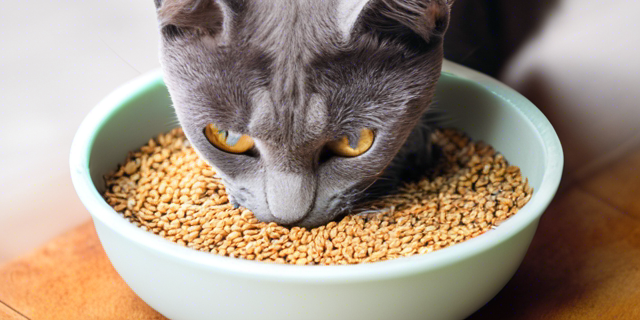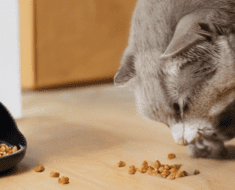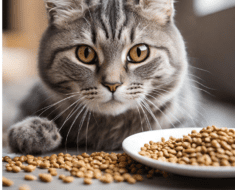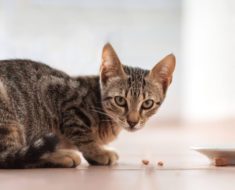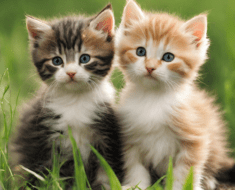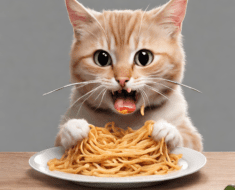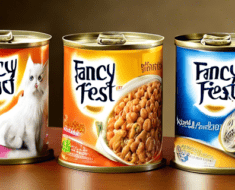Cats eat grain-free food due to their carnivorous nature and inability to digest grains efficiently. This diet closely matches their natural diet in the wild, providing essential nutrients for optimal health.
The increasing popularity of grain-free cat food reflects pet owners’ desire to provide a diet that supports their feline companions’ overall well-being and digestive health. Understanding the reasons behind this dietary choice can help pet owners make informed decisions when selecting the best nutrition for their beloved cats.
By prioritizing grain-free options, cat owners aim to ensure that their furry friends receive a diet that aligns with their biological needs and promotes longevity and vitality. Choosing grain-free food for cats is an important aspect of responsible pet ownership and can contribute to a healthier and happier life for our feline companions.
The Rise Of Grain Free Cat Food
Grain-free cat food has gained popularity due to health trends. Many cat owners believe it benefits their pets’ digestive systems and overall well-being. Marketing strategies by pet food brands have focused on promoting these benefits to attract more consumers.
Cat’s Biological Diet
Cats naturally thrive on a high-protein, low-carbohydrate diet. Grain-free food replicates their biological diet, providing essential nutrients without fillers. This helps cats maintain a healthy weight, and energy level and supports their overall well-being.
| Cat’s Biological Diet |
| Carnivorous Instincts: Cats have an innate need for meat due to their wild ancestors. |
| Nutritional Requirements: A high-protein diet is crucial for a cat’s health and development. |
Allergies And Sensitivities
Cats can develop allergies to grains, causing skin irritation and gastrointestinal problems. Grain-free food can alleviate these issues by eliminating potential allergens. Cats with sensitive stomachs may benefit from grain-free diets, as grains can lead to digestive discomfort. Grain allergies are not uncommon in cats and can manifest in various symptoms, so it’s important to monitor your cat’s well-being. Choosing grain-free options can provide relief and improve your cat’s overall health.
Weight And Digestive Health
Grain-free cat food can have a positive impact on weight and digestive health. Weight regulation is a crucial aspect of a cat’s overall well-being. By consuming a grain-free diet, cats are less likely to gain excess weight, reducing the risk of obesity-related health issues. Additionally, grain-free food often contains higher protein levels which can help with satiety and weight management.
A cat’s digestive health is also greatly influenced by their diet. Grain-free food can be easier for cats to digest, as it doesn’t contain ingredients that may cause sensitivities or allergies. This can result in optimal nutrient absorption and less digestive discomfort for your cat. Furthermore, by feeding your cat grain-free food, you can potentially support their gut health and overall digestion.
Ingredients To Avoid
Grain-free cat food has become increasingly popular among cat owners, as it is believed to be a healthier alternative to traditional grain-based cat food. By eliminating grains from their diet, cats can avoid potential allergies and digestive issues. However, it is crucial to be aware of the ingredients that should be avoided when choosing a grain-free cat food.
- Fillers and Additives: Avoid cat foods that contain fillers like corn, wheat, and soy. These ingredients provide little to no nutritional value and can cause digestive problems in cats.
- Artificial Preservatives: Look out for artificial preservatives such as BHA, BHT, and ethoxyquin. These chemicals have been linked to health issues in cats and should be avoided.
Instead, opt for grain-free cat food options that contain high-quality protein sources such as chicken, turkey, or fish. Additionally, natural preservatives like tocopherols and ascorbic acid can be used to maintain freshness without compromising your cat’s health. Remember to check the ingredient list carefully and consult with your veterinarian to ensure you are providing the best nutrition for your furry friend.
Frequently Asked Questions On Why Cats Eat Grain-Free Food
Why Do Cats Need Grain-Free Food?
Cats need grain-free food because their digestive systems are better suited for a diet high in protein. Grains can cause allergies and digestive issues in cats.
Why Do Vets Not Like Grain-Free Cat Food?
Vets may not prefer grain-free cat food due to potential nutrient deficiencies. Some grain-free diets lack essential nutrients.
Why Free Feeding Is Good For Cats?
Free feeding is good for cats as it allows them to graze throughout the day. This mimics their natural eating habits and helps prevent overeating. It also reduces stress around meal times and can be convenient for busy pet owners.
What Is The Healthiest Cat Food For Indoor Cats?
The healthiest cat food for indoor cats is a balanced and nutritious diet specifically formulated for their unique needs. Look for high-quality ingredients, such as lean protein sources and essential nutrients, to support their overall health and prevent weight gain.
Regular veterinary check-ups can offer further guidance on the best diet for your indoor cat.
Why Should I Feed My Cat Grain-Free Food?
Feeding your cat grain-free food ensures a healthier diet that aligns with their natural carnivorous instincts.
Conclusion
Choosing grain-free food for your cat can have numerous health benefits. By providing a natural and species-appropriate diet, you can promote better digestion, healthier skin and coat, and overall well-being for your feline companion. Consider consulting with a veterinarian to determine the best dietary options for your cat’s specific needs.
